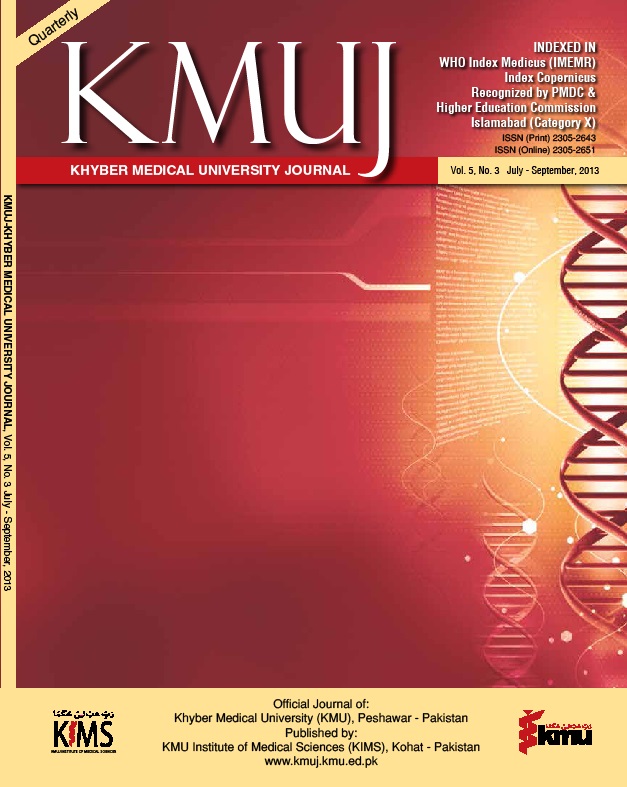RESEARCH ETHICS COMMITTEES (RECs) AND MONITORING OF BIOMEDICAL RESEARCH IN PAKISTAN
Main Article Content
Abstract
Article Details
Work published in KMUJ is licensed under a
Creative Commons Attribution 4.0 License
Authors are permitted and encouraged to post their work online (e.g., in institutional repositories or on their website) prior to and during the submission process, as it can lead to productive exchanges, as well as earlier and greater citation of published work.
(e.g., in institutional repositories or on their website) prior to and during the submission process, as it can lead to productive exchanges, as well as earlier and greater citation of published work.
References
REFERENCES1.Trials of war criminals before the Nurembergmilitary tribunals under control council law no. 10. Nuremberg, October 1946–April 1949. Washington, D.C.: U.S. G.P.O, 1949–1953.2.World Medical Association. World medicalassociation declaration of Helsinki: Ethical principles for medical research involving human subjects. Available from URL: http://www.wma.net/en/30publications/10policies/b3/17c.pdf (Cited on June 01, 2013).3.Royal College of Physicians. Supervision of the ethics of clinical research investigations in institutions. London: HMSO, 1967.4.Curran WJ. The Tuskegee syphilis study. N Engl J Med 1973; 289(14):730-1.5.Legislative history of title II-protection of human subjects of biomedical and behavioralresearch of the National Research Act, PL 93-348. Available from URL: http://history.nih.gov/research/downloads/PL93-348.pdf (Cited on June 01, 2013).6.National Commission for the Protection of Human Subjects of Biomedical and Behavioral Research. The Belmont Report: Ethical Principles and Guidelines for the Protection of Human Subjects of Research, Report of the National Commission for the Protection of Human Subjects of Biomedicaland Behavioral Research. DHEW Publication No. (OS) 78-0012. Available from URL: http://videocast.nih.gov/pdf/ohrp_belmont_report.pdf (Cited on June 01, 2013).7.Ana J, Koehlmoos T, Smith R, Yan LL: Research misconduct in low- and middle-income countries. PLoS Med 2013, 10(3):e1001315.8.Moss AJ, Francis CW, Ryan D. CollaborativeClinical Trials. N Engl J Med 2011; 364:789-91.9.Angell M. The ethics of clinical research in the third world. New England J Med 1997;337:847-9.10.Mudur G. Johns Hopkins admits scientist used Indian patients as guinea pigs. Br Med J 2001;323:1204.311.The Council for International Organizationsof Medical Sciences (CIOMS). InternationalEthical Guidelines for Biomedical Research Involving Human Subjects. CIOMS, Geneva 2002. Available from URL: http://www.cioms.ch/publications/guidelines/guidelines_nov_2002_blurb.htm (Cited on June 02, 2013).12.Islamic Organization for Medical Sciences. International ethical guidelines for biomedicalresearch involving human subjects “an Islamic perspective.” In El-Gendy AR, Al-Awadi ARA, editors. The international Islamic code for medical and health ethics. Kuwait: Islamic Organization for Medical Sciences; 2005:Vol 2, 121-276.13.Pakistan Medical Research Council. NationalBioethics Committee (NBC). http://www.pmrc.org.pk/NBC%20Guidelines.htm (Cited on June 02, 2013).14.Pulse Pakistan. National Bioethics Committeemeets at last after 28 months. ProfessionalMedical Publications. August 15-31, 2009. Available from URL: http://www.pulsepakistan.com/archives/15-08_09/news7.htm (Cited on June 02, 2013).15.Pakistan Medical Research Council. NationalBioethics Committee Pakistan, EthicalResearch Committee-Guidelines. Pak Med Res Counc. (Online): Available from URL: http://www.pmrc.org.pk/erc_guidelines.htm(Cited on June 02, 2013).16.Jafarey AM, Iqbal SP, Mariam Hassan M. Ethical review in Pakistan: the credibility gap. J Pak Med Assoc 2012;62(12):1354-7.
